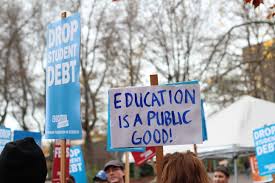The YCL-LJC rejects the narrow limitations for the CESB (Canadian Emergency Student Benefit) and expresses the urgent necessity to include all students without confining them to poverty. While students can finally access their own emergency plan the CESB does not address the fundamental problems with the condition of students. We also reject the need to provide documentation to be constantly looking for work that pays poverty wages in unsafe conditions to receive such benefit while still trying to balance commitments to studies.
From the outset, this benefit arbitrarily amounts to $1,250 per person per month, while the Canadian Emergency Response Benefit is more generous by $750 per month. This misconception that students have less spending than workers shows how the Trudeau government is completely out of touch with student reality. With student debts averaging $30,000 and average annual tuition fees exceeding $6,500, all of that money will only go towards paying those fees. A simple calculation is enough to understand that at best, those who will have access for four months (the maximum duration of the program) will only receive $5,000 and will therefore on average start the year with a shortfall of $1,500 towards tuition. In addition, once a student earns more than $1,000 in a month, they are no longer eligible for this benefit.
Tuition fees are just one of many expenses. Many students who, either by choice but often by necessity, have to move out during their studies. In urban centres, where the majority of universities are located, property speculation makes rental prices inaccessible: the monthly price of a one bedroom apartment, in Vancouver and Toronto, goes beyond $2000 a month. It is therefore impossible that the CESB alone is sufficient to allow students to keep their heads above water during this difficult period, which risks causing many to abandon their studies due to lack of means.
As with most of Trudeau’s financial measures, this service was taken in a hurry and does not respond in any way to the fundamental issues that affect students. Already, the $9 billion that the CESB costs is one billion short of guaranteeing free post-secondary education for all for a whole year, contrast that with this program of four months at most and to which some, particularly international students, do not have access.
If Trudeau prefers to put in place temporary emergency measures, it is not so much because he cares about the fate of students, but rather because these measures only serve to put a patch on a system based on personal debt, privatization and commodification of education. In addition, these programs can disappear overnight, and the trend towards the commodification of post-secondary education is likely to worsen when the Liberal government uses the $252 billion deficit as justification to return to a balanced budget and impose austerity measures, cut public spending and put the burden of the crisis on the backs of students.
That is why we young Communists are calling for emergency reform of post-secondary education, rather than an emergency benefit. We demand a 100% public, universal and free education system: education must be guaranteed by a public service monopoly and not governed by market logic. When we talk about free education, we also demand the end of any financial obstacle to access to higher education, which is why we are fighting for a viable student allowance and the massive construction of student housing.
It is only with the satisfaction of these measures that we will be able to remove education from economic feudalism. This is precisely what Trudeau refuses to do. As a proud spokesman for the capitalist class, he ensures that the exit from the crisis is smooth for the big companies while students and youth pay for the costs.

